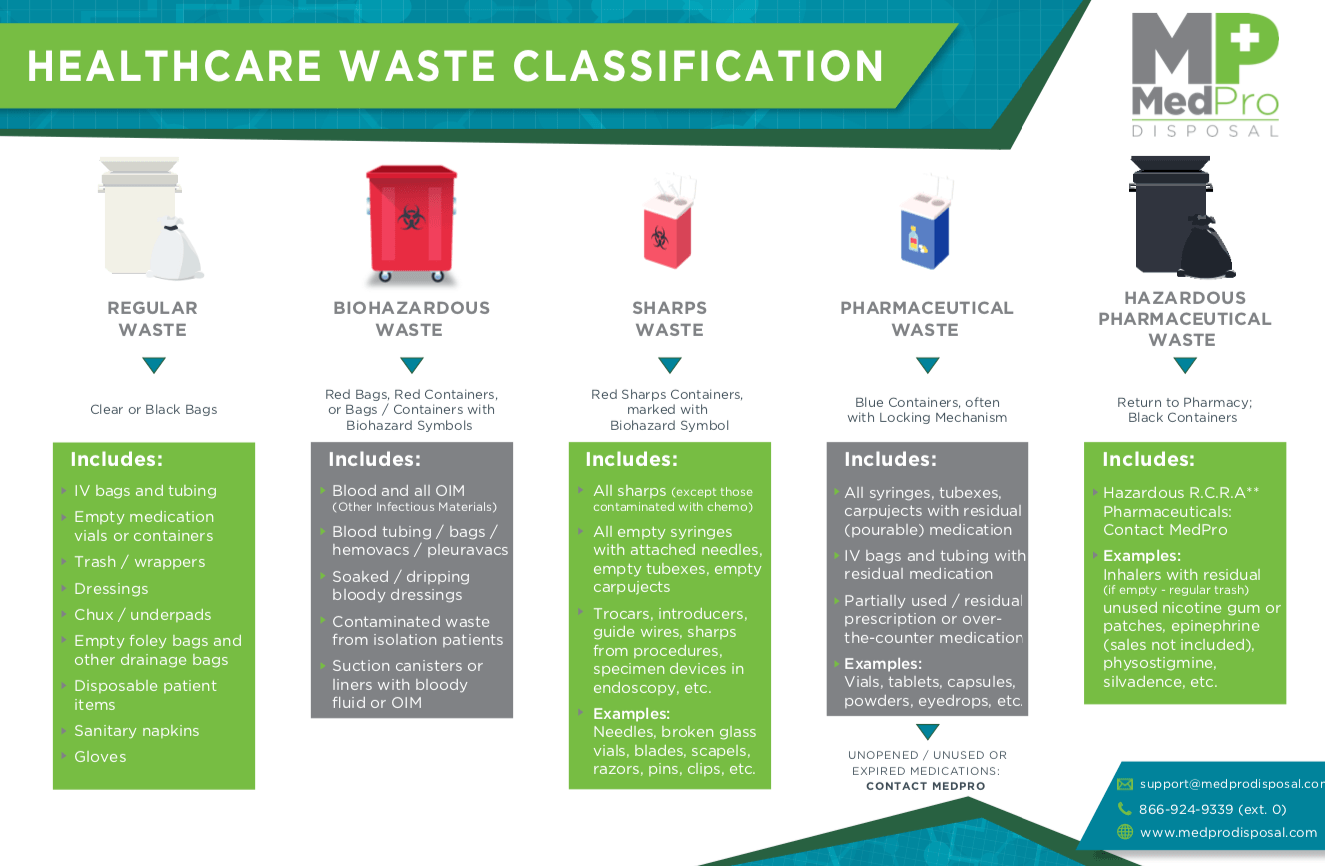Healthcare Hygiene Heroes: The Unsung Role of Medical Waste Removal Service
Healthcare Hygiene Heroes: The Unsung Role of Medical Waste Removal Service
Blog Article
The Significance of Proper Waste Disposal Practices
From the effects of improper waste disposal on our setting to the long-lasting implications for future generations, the relevance of adopting lasting waste management methods can not be overemphasized. By exploring the environmental influence of reckless waste disposal, the advantages of recycling efforts, and the value of community interaction in waste decrease efforts, a deeper understanding of why appropriate waste disposal methods are crucial emerges.
Ecological Effect of Improper Disposal
Inappropriate disposal of waste positions a considerable hazard to the setting as a result of its destructive effects on environments and human wellness. When waste is not properly managed, it can lead to pollution of the water, air, and soil, causing harm to numerous plant and pet species. click here. Chemicals and toxins from improperly disposed waste can leak right into the ground, contaminating groundwater resources and influencing the wellness of both wild animals and human beings
Additionally, the buildup of waste in garbage dumps generates greenhouse gases like methane, adding to environment change and global warming. Improper disposal practices likewise lead to littering, which not only weakens the visual value of the setting yet can also harm wildlife through ingestion or entanglement.
To mitigate these environmental influences, it is essential for areas and individuals to take on correct garbage disposal techniques such as reusing, composting, and responsible harmful waste disposal. By taking these steps, we can help protect ecosystems, protect natural deposits, and guard human wellness for future and current generations.
Benefits of Recycling Programs
Frequently joining reusing programs supplies many advantages for both the environment and culture all at once. One of the key benefits of recycling is the conservation of natural deposits. By reusing products such as paper, steel, glass, and plastic, less resources need to be removed from the earth, resulting in reduced logging, mining, and boring tasks. This preservation of sources not just assists in maintaining environmental equilibrium yet additionally adds to sustainable growth.
Furthermore, reusing plays a crucial function in reducing energy intake and greenhouse gas exhausts. The manufacturing of items from recycled materials generally needs much less energy compared to making from virgin sources - medical waste removal. Therefore, the carbon footprint connected with the manufacturing process is dramatically decreased, helping in the battle versus environment change
In addition, recycling programs produce task possibilities in the recycling industry, promoting financial growth and social welfare. By motivating the recycling and reuse of products, these programs sustain a round economy that lessens waste generation and optimizes source efficiency, ultimately resulting in a cleaner, greener future for generations to find.
Contaminated Materials Monitoring Standards
Executing efficient dangerous waste management guidelines is important for lessening ecological and health and wellness threats connected with the inappropriate disposal of unsafe products - click here. Correct handling, treatment, and disposal of contaminated materials are crucial to prevent contamination of soil, water resources, and air
One trick guideline is proper labeling of hazardous waste containers to guarantee safe handling and transport. In addition, centers should abide by rigorous storage space needs to stop leakages, spills, or mishaps that might threaten human health and wellness and the atmosphere. Routine training programs for employees on contaminated materials management practices are also vital to ensure conformity with laws and advertise a culture of safety.
Additionally, contaminated materials should be set apart based upon its residential or commercial properties to avoid chemical reactions that can cause hazardous circumstances. Executing a comprehensive waste monitoring system can assist monitor the activity of harmful materials from generation to disposal, guaranteeing transparency and liability. By complying with these guidelines faithfully, services and industries can add to a much safer and cleaner setting for existing and future generations.
Neighborhood Participation in Waste Reduction
To efficiently address the ecological and health dangers linked with dangerous waste monitoring, involving the community in waste decrease initiatives is extremely important. Area involvement plays a critical function in advertising sustainable waste monitoring practices and promoting a culture of environmental duty. By educating citizens concerning proper waste partition, reusing, and composting techniques, neighborhoods can significantly decrease the quantity of waste sent to landfills, consequently reducing ecological air pollution and conserving all-natural sources.
Community involvement in waste reduction programs additionally helps in increasing recognition concerning the importance of waste reduction and motivates people to take on green practices in their lives - medical waste disposal. Collaborative initiatives in between local authorities, waste management companies, and area participants can lead to the implementation of effective waste reduction strategies tailored to the particular needs of each neighborhood or town
Furthermore, neighborhood engagement cultivates a sense of possession and accountability amongst homeowners, empowering them to take aggressive actions in the direction of minimizing waste generation and advertising a cleaner, healthier atmosphere for current and future generations. By working with each other towards typical waste decrease objectives, neighborhoods can make a substantial impact on mitigating the adverse effects of inappropriate garbage disposal methods.

Future of Sustainable Waste Practices
Typical waste disposal methods, such as landfilling and incineration, are no much longer sustainable in the long term due to their considerable ecological influences. Relocating onward, the future of lasting waste practices exists in welcoming a round economy method, where resources are reused, recycled, or repurposed to lessen waste generation.
Technical advancements play a key duty in shaping the future of sustainable waste methods. Advanced waste sorting and recycling innovations can assist improve the effectiveness of waste administration processes, enabling for the healing of useful resources from waste streams. Furthermore, the adoption of biodegradable materials and composting methods can help in reducing the amount of natural waste winding up in garbage dumps, consequently alleviating greenhouse gas discharges.
Moreover, promoting consumer understanding and education and learning on correct waste partition and disposal methods is necessary for driving behavioral change in the direction of sustainability. By cultivating a culture of waste reuse, decrease, and recycling, communities can collectively add to a cleaner and much healthier atmosphere for future generations.

Verdict
Finally, correct waste disposal methods are crucial for decreasing environmental effect and advertising sustainability. By executing reusing programs, taking care of dangerous waste effectively, and encouraging neighborhood participation in waste decrease efforts, we can work towards a cleaner and much healthier environment. It is crucial for federal governments, businesses, and individuals to focus on lasting waste practices for the future well-being of our world.

From the consequences of incorrect waste disposal on our atmosphere to the long-lasting ramifications for future generations, the value of taking on lasting waste monitoring methods can not be overstated. By checking out the environmental impact of untrustworthy waste disposal, the advantages of reusing efforts, and the significance of area engagement in waste reduction efforts, a deeper understanding of why correct waste disposal techniques are critical arises.
By informing locals about correct waste partition, reusing, and composting strategies, neighborhoods can substantially minimize the amount of waste sent out to garbage dumps, thus reducing ecological contamination and conserving all-natural sources. (click here)
Relocating forward, the future of sustainable waste techniques exists in embracing a circular economy strategy, where sources are recycled, reused, or repurposed to decrease waste generation.
Advanced waste sorting and reusing modern technologies can aid boost the performance of waste monitoring procedures, permitting that site for the recuperation of useful sources from waste streams.
Report this page